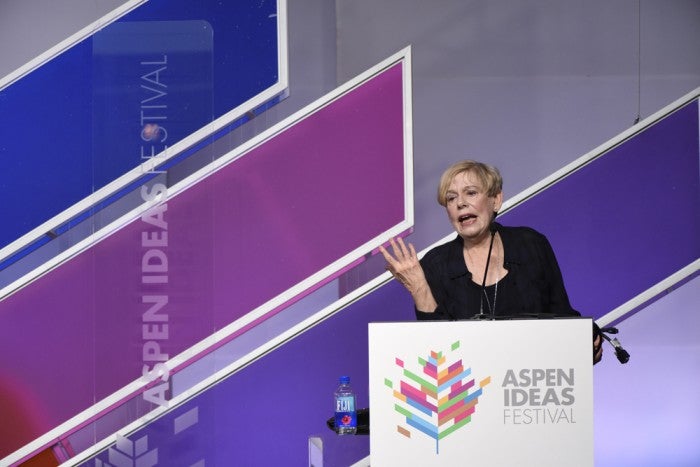
(Photo Credit: Daniel Bayer)
Merlijn Twaalfhoven is a Dutch composer who works in conflict areas and symphony halls alike. He spoke on a panel called “The Middle East, Art, and Overcoming Division” at the 2015 Aspen Ideas Festival. Below, he reacts to religious author and expert Karen Armstrong’s 2015 Festival panel, “Is Religion Really Violent?”
The views expressed in this piece do not necessarily reflect those of the Aspen Institute.
I used to be convinced of the violent role of religion in history. Events in the Middle East today might confirm the belief that religion brings us nothing more than destruction. On Monday, I was fortunate to meet Karen Armstrong. She convinced me that actually the opposite is true.
If you study the reasons people engage in violent conflict, like in Syria or Iraq today, it becomes clear they have very secular motives. They might use religion as a pretext, even if they’re not aware of it. Research shows only 20 percent of people in Britain that commit themselves to jihad had a religious upbringing. As Armstrong pointed out: “The first time they read the Koran was most probably in prison.”
Lack of perspectives in life, boredom, and frustration are an explosive mix; the Islamic State uses this as fuel for their battle. As a powerful strategic alliance, the Islamic State finds that mainstream media is more than willing to spread their twisted version of Islam.
Newspapers and television love the iconic images of smoke, fire, and destruction. They are most grateful for the new chapter of thrills the Islamic State offers: theatrical and graphic images of beheadings. That’s gold if you want to attract attention.
Armstrong’s mission is to help us think more clearly. Her writings lucidly distinguish religious teaching from nationalistic propaganda. Only by separating the causes of violence from the culture of Islam can we break a direct spiral between despair, extremism, violence, media coverage, and repressive measures.
Why is Armstrong’s analysis not more prominently heard? Are her books too big to go viral? Why isn’t her message breaking news?
Armstrong advocates using compassion to address violence. I always feel a bit uneasy with strong words like this. Isn’t it too easy to call on everybody’s compassion and expect the violence to stop? But when you listen more closely, it becomes clear that she has all the evidence and research making a strong case.
How might we address the lack of compassion by anyone that puts a short-sighted link between violence and Islam? We can actually fight the Islamic State by engaging with the powers that make a profit from sensational media coverage. Violence is not just smoke and fire. It’s brainless words, frantic headlines, and ignorant simplifications.

